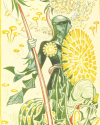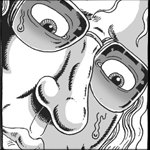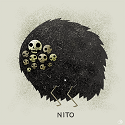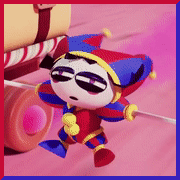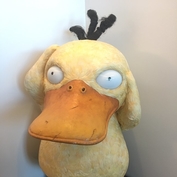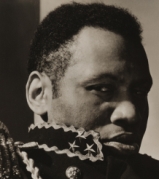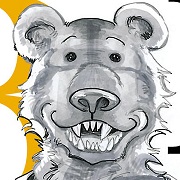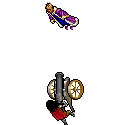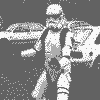|
Obligatory "all those new replies, did something happen? Oh, of course not" post. I'm really enjoying the picking-apart though. I said with a shrug and an amused twinkle in my eyes.
|
|
|
|

|
| # ? May 23, 2024 20:53 |
|
crap
|
|
|
|
BravestOfTheLamps posted:I've repeatedly stated the problem with that thesis - why is Kvothe's story so important? He's a living legend - but what is his legend? What does he represent? The answer is only his own exceptionality. It's not even in the sense that he represents heroism or adventure. Maybe anti-establishment cheekiness if you squint your eyes (or more accurately, close them). Kvothe is exceptional because he is exceptional. It's a self-referential nightmare. BravestOfTheLamps posted:One Day in the Life of Ivan Denisovich has a plot (man goes through a day in a prison camp), and it revolves around a central theme (enduring authoritarianism). It is about something. BravestOfTheLamps posted:I've always made my critical propositions very clear. For example, I have said that Kingkiller is not a story about anything but itself, which makes it irrelevant and pointless. This can be disproved by showing that Kingkiller actually tells a consistent story around some theme. Like it's about the failure of heroism (it isn't), about the emptiness of legends (it isn't), about the meaninglessness of fantasy (it isn't), or how artificial society and its positions are (it isn't). e: It might be about the power of stories,, though! I've just finished TWMF and saw you were doing a running critique. You seem to have devoted a lot of effort and energy writing about a book without really grasping the fundamental story. The first page of the book is about a man who is waiting to die. For all the puffery and masturbation in Kvothe's story, the man telling it is suicidal because of his life choices. It's a tragedy that tells of the folly of hubris and arrogance, it's literally spelled out above the bar on the sword of the Chandrian he killed. Kote tells a story about his past as Kvothe the Bloodless, an exceptional and headstrong young man who rises above adversity to [book three to go here], only to end up initiating a massive civil war between Vintas and Atur, breaking the walls down between the fae and the real unleashing hordes of skinwalkers and spider demons, and bringing about the end of the world. There are two complementary plots, the primary being the tale of tragedy about the rise and fall of Kvothe the Bloodless, and the second is the redemption/reincarnation of Kote the Barkeep. You don't need to read the third book to know what happens to Kvothe the Bloodless, he gets expelled from the university, kills a king, kills an angel, kills Cinder, loses Denna. After a series of calamitous events entirely of his own making he ends up faking his death and buying a tavern. It fits the Aristotle tragic plot pretty perfectly. We're nearing the top of the pyramid at the end of the second book, we already know that it ends in tragedy. Here's a picture of it i found on the internet:  If we were to use an analogy to a popular work of fiction, at the end of TWMF Kvothe is akin to Luke Skywalker training in Degoba with wise Master Yoda. He has saved the day multiple times, destroyed the death star, saved his people on Hoth, and is basically invincible - he knows kung-fu, sex, and magic like Tarbolin the great. Kote, meanwhile, is Luke Skywalker dangling from an antenna under cloud city, his hand cut off, his friends dead or kidnapped, lost, with the knowledge that his father is not who he thought he was. It's fairly obvious book three will be about (1) the story of Kvothe going to cloud city to rescue his friends and getting his rear end firmly handed to him, and (2) maybe the battle of Endor. Given the pace of the books it's more likely there will be an allusion in the ending that Kvothe has left the Inn to go fight the battle of Endor, but still, there seems to be a fairly obvious plot to grasp. There's plenty of sub-themes running throughout as well, the unreliable nature of narrators and storytellers is pretty much part and parcel to the plot, and seeing that Kvothe is a liar and the biggest storyteller of them all, it's likely there is a lot of unreliable narrative in his own story. The whole the Denna / Denner Resin connection and his additive behavior towards her is written as a very unhealthy relationship is a too easy allegory of substance abuse. I think there's a lot more in there than you seem to be giving it credit for.
|
|
|
|
jivjov posted:Hi, how are you? Get that hair tugging PTSD on.
|
|
|
|
"Sword of the Chandrian he killed." Wut
|
|
|
|
Goffer posted:The first page of the book is about a man who is waiting to die. Most of the published text of Kingkiller is completely irrelevant to this, beyond basic set-up. There is little resemblance to Aristotle's ideal plot (not to speak of the Aristotelian unities of action, time, and place). The text primarily consists of the unironic aggrandizement of the protagonist. A third book might hypothetically redeem some of this, but not all of it, because most of the novels' text could be cut without any loss. Kvothe being an unreliable narrator has had the barest of impacts on the action of the story, as there is precious little interplay between truth and lie in the text. If the narrative is mostly lies, it's rendered even more pointless. The classism and sexism can be read as satirical, but this is mostly lost in the poorly written self-aggrandizement. You've described some of the projected plot of the books, but haven't actually described the story beyond basic concepts like that the hero faces adversity. It's nominally about a man waiting to die, but the 1800+ pages.published so far haven't serviced that story very well. BravestOfTheLamps fucked around with this message at 18:52 on Jun 20, 2016 |
|
|
|
LET’S READ THE KINGKILLER CHRONICLE CRITICALLY Part 28: “’Ve vanaloi. Tu teriam keta. Palan te?’” In Chapter 70, “Signs”, Kvothe has slept in another inn and is weighing his options when he hears some other patrons talking about how a wedding party has been killed near a town upriver, with blue flames left behind. Kvothe realises that this could be the work of Chandrian. Trebon is a good distance away, so Kvothe needs a horse, and before that, money for a horse. He goes to Devi, who already knows that Kvothe was attacked, and treats his wound when he displays it. Kvothe starts bargaining for another loan by offering a secret entrance to the Archives as collateral. For once he outmaneuvres Devi. This is how the Chandrian re-enter the narrative: quote:While my hands worked, my thoughts wandered. Could I confront Ambrose? Threaten him? Not likely. He knew I couldn’t successfully bring charges against him. But maybe I could persuade a few of the masters of what had really happened. Kilvin would be outraged at the thought of hired killers using a dowsing compass, and perhaps Arwyl… Now the obvious criticism is that the plot doesn’t flow from the character’s actions. More the point, there’s no actual structure to this story. Kvothe gets attacked, then he happens to hear about the Chandrian the next morning. Now this is not fundamentally irredeemable: the Chandrian are the ultimate outside element, an inexplicable force of destruction. There is no sense to how it works. The problem, however, is that there’s no progression to the story. Think about it this way: this could have happened at any point in the story after Kvothe arrived in Imre without really impacting the story. The only thing that would change is that Kvothe will be unable to kill a mostly incidental dragon, which would make him less exceptional. Really, this whole development merely results in Kvothe being a more exceptional person. quote:“Access to the Archives.” In Chapter 71, “Strange Attraction”, Kvothe bargains for a horse. There are many words dedicated to horse intrigue. Rothfuss describes how difficult it is to ride a horse rough-shod across the country, and Kvothe describes how intelligent he is for treating his properly, but this is again something that has no real place in the narrative. Kvothe is riding through the Commonwealth, but the setting is once again impressively vague and empty. It goes back to the problem of “world-building”: there’s only props without any central idea or theme to hold them together. So you have lots of words about horses with only the barest understanding of the milieu. There’s roads and farms, and things get slightly desolate. quote:An hour later I passed through a small town, hardly more than a church and a tavern that happened to be next to each other. I stopped long enough to let Selhan drink a bit from a trough. I stretched my numb legs and looked up anxiously at the sun. On the road to Trebon, he talks to a travelling tinker, and finds out that he was cheated on his bargain. Kvothe trades the horse for a piece of Loden-stone, which is “star-iron” and hugely valuable He reaches Trebon, providing both a stunningly liveless portrait of a town and more disdain for parochialism. quote:As I crested the hill, I saw Trebon sprawling out below, tucked into a low bowl made by the hills. It wasn’t a large town by any means, perhaps a hundred buildings sprawling around a dozen winding, packed-dirt streets. Let’s skip ahead to the next chapter for more liberal disdain: quote:I felt a ridiculous amount of relief when I saw Denna waiting outside, leaning against the horse post. Her eyes were closed and she had her face tilted toward the sun. She sighed contentedly and turned toward the sound of my approaching footsteps. This patronizing disdain started in Chapter 1 and has never let up. And it’s like the horrid sexism, in that it’s painfully obvious how fans refuse to engage with it. Just look at how mum a certain poster goes whenever sexism is brought up. The sexism and classism stick out because there isn’t simply anything redeeming to the text. And lest we forget, he wave a definitive case of you-know-what: Trebon is “halfway between a mining town and a farming town.” This is the very definition of a Rothfussian Attribute, a descriptor so broad as to draw attention and to distract. At the town’s inn he pretends that his cousin was at the wedding, and finds out that there was a witness to the attack resting upstairs, who as I’ve spoiled already is Denna. In Chapter 72, “Borrorill”, Kvothe and Denna leave the inn for “the Mauthen farm” at nearby Borrorill, where the massacre happened, and aim some pointed words at the townsfolk (see the previous quote above). As they’re traveling towards the farm, Kvothe and Denna talk about having missed each other in Imre, and Denna reveals that she has found a potential patron for her music. She was at the wedding at this patron’s request. The patron is wealthy and violently secretive so that Denna refuses to reveal her name, and Kvothe and Denna throw around banter about what pseudonym to give him. They settle on “Master Ash” as they stumble upon the burned out farm. Kvothe’s and Denna’s dialogue is mostly banter, and because Rothfuss is not a witty or insightful writer, it is all very bad. Firstly, as very thoroughly established by now, Rothfuss has no understanding or appreciation for flow or tone of language. Secondly, Rothfuss simply overwrites, as if to compensate for the lack of any real content to the story. Kvothe’s and Denna’s conversations are interminable, but boil down to pedantry: quote:Denna took a step away from me, muttering and rubbing at her eyes. The part of my arm where her hand had rested suddenly felt very cold. Thirdly, Rothfuss cannot focus on one tone while writing, which leads to the by ow well-observed mixing of conflicting tones. Thus Kvothe investigating a massacre is punctuated by clunky witticisms. In the above quote you have the ominous note of ash, but then Rothfuss meanders into pedantry passing as wit. Below you’ll find much the same: quote:“I really didn’t see much,” she said as she daubed her face on her shirt-sleeve. “I played before the wedding, then again while they were getting ready for supper. I kept expecting my…” she gave a faint smile, “…Master Ash to make an appearance, but I knew I couldn’t dare ask about him. For all I knew, the whole thing was another test of his.” quote:You were telling me about what happened to Master Ash before I rudely interrupted,” I prompted gently as I could. Kvothe discovers that the iron on the farm has inexplicably rusted through, which also happened when the Chandrian attacked his troupe, and which is one of their signs identified in songs. This is also another striking example of how Rothfuss confuses tones and motifs to ultimately produce no impression whatsoever, as the dread of the scene evaporates into more banter: quote:“Do you know that children’s song?” Denna looked at me blankly, so I sang: So yes, Denna is associated with the unattainability of the Chandrian, so she’s an extension of Kvothe’s quest. The quest for the unreachable is also the plot of Baudolino, as I may have alluded. The Chandrian’s role is played by Prester John’s kingdom, and Denna is replaced by a character called Hypatia. Take in itself, there is nothing wrong with the motif of the unattainable, it’s simply that most of the text is a waste. When you look at the action that Kvothe’s and Denna’s romance involves, it’s insubstantial: they talk. That’s mostly it. Rothfuss doesn’t even have the decency to have them gently caress. quote:I knew the shape of stories. When a young couple comes to a river there is a definite shape to what will happen next. Denna would bathe on the other side of the nearby fir tree, out of sight on a sandy bit of shore. I would move off a discrete distance, out of sight, but within easy talking distance. Then…something would happen. She would slip and turn her ankle, or cut her foot on a sharp stone, and I’d be forced to rush over. And then… Chapter 73, “Pegs”, mostly concerns Kvothe covertly pumping information from an embarrassingly accented swineherd who happens to be wandering nearby. The accent turns out to be plot-relevant, as “Borrorill” is actually a mangling of “Barrow Hill”. The swineherd is heading south because he saw blue flame two nights ago and was spooked, which Kvothe finds strange since the Mauthen wedding was last night. Kvothe and Denna head back to the farm. Kvothe gives it another once-over and explains to Denna that Borrorill was actually home to an ancient hillfort. They decide to spend the night on top of the hill to observe anything going around. Aside from the awful transliterated accent, it’s an inoffensive chapter. But it's still offensive. quote:
quote:
In Chapter 74, “Waystone”, Kvothe and Denna spend the night on the hill, speculate why the Chandrian attacked the farm, and are attacked by a dragon. Yes, this is novel is starting to live up to the fantasy label. quote:Denna caught me. If this were some heroic ballad, I would tell you how she clasped my hand firmly and pulled me to safety. But the truth is she got hold of my shirt with one hand while the other made a tight fist in my hair. She hauled hard and kept me from falling long enough for me to catch a grip and scramble to the top of the stone with her. ODDLY REPEATED WORD OR PHRASE quote:The farmer spoke up, breaking my reverie. “Here’s Borrorill.” quote:I snapped out of my reverie, confused. “I’m sorry, what?” JUST ROTHFUSS THINGS quote:So we rode in silence. It was nice just being near her. You wouldn’t think a girl in bandages with a blackened eye could be beautiful, but Denna was. Lovely as the moon: not flawless, perhaps, but perfect. BravestOfTheLamps fucked around with this message at 23:52 on May 17, 2017 |
|
|
|
Serious question: Until that bit with the song, did anyone pronounce Chandrian to rhyme with plan?
|
|
|
Goffer posted:the unreliable nature of narrators and storytellers is pretty much part and parcel to the plot, and seeing that Kvothe is a liar and the biggest storyteller of them all, it's likely there is a lot of unreliable narrative in his own story. The whole the Denna / Denner Resin connection and his additive behavior towards her is written as a very unhealthy relationship is a too easy allegory of substance abuse. So far nothing does; WMF is especially bad about it.
|
|
|
|
|
For some reason ‘reverie’ seems to be the most overused word in fantasy fiction. That or ‘tunic.’ I guess it’s a really easy device to bring things back to the actual plot after a big exposition-dump. “I stopped to think about all this backstory stuff that explains my feelings and motivations up to this point in the story, also thinking about some important world building details that the audience needs to know. Then a goblin attacked me, snapping me out of my reverie.”
|
|
|
Goffer posted:Kvothe the Bloodless I'm amused you keep calling him this in your post when that little story is the best example of how forced and pointless most aspects of Kvothe's legend are
|
|
|
|
|
TheIncredulousHulk posted:I'm amused you keep calling him this in your post when that little story is the best example of how forced and pointless most aspects of Kvothe's legend are The origin of his Bloodless name is the closest this book came to being basically the way he described in the beginning. The story was supposed to be about how overblown everything about him was, and the nearly all of it was fabrications. What it's come down to is that he did all of the things people say he did, but it's not as awesome as you think because he was poor and lovelorn.
|
|
|
|
SpacePig posted:The origin of his Bloodless name is the closest this book came to being basically the way he described in the beginning. The story was supposed to be about how overblown everything about him was, and the nearly all of it was fabrications. What it's come down to is that he did all of the things people say he did, but it's not as awesome as you think because he was poor and lovelorn. Ha, that's a really succinct way of putting it.
|
|
|
|
I don't know why some people want Kvothe to be an unreliable narrator because if that's the case then these books are even worse. It wouldn't improve the story at all and would in fact make the first two books entirely pointless.
|
|
|
|
Andrast posted:I don't know why some people want Kvothe to be an unreliable narrator because if that's the case then these books are even worse. It wouldn't improve the story at all and would in fact make the first two books entirely pointless. The first two books consist entirely of wheel-spinning that goes nowhere, so they're entirely pointless either way.
|
|
|
Andrast posted:I don't know why some people want Kvothe to be an unreliable narrator because if that's the case then these books are even worse. It wouldn't improve the story at all and would in fact make the first two books entirely pointless.
|
|
|
|
|
I think it depends on how unreliable of a narrator he is. Obviously, since everything is told from his point of view, we're only getting one part of any story. Fela may never have been attracted to him, he probably wasn't as clever as he thought he was when dealing with Ambrose, he probably didn't gently caress a fairy as good as he thinks he did. A biased detail here and there doesn't change much. In fact, it almost makes it more interesting for if he ever dedicates time to modern-day stuff. Running into old friends or teachers, or even Ambrose himself, and getting their take on things could prove to be somewhat interesting. Kvothe making things up from whole cloth, though, would be incredibly stupid. It means that these books are less about Kvothe himself, and more about the Chonichler being tricked into staying at some guy's inn for 3 days. Nothing meant anything, all the wheel spinning was for even less than nothing, and the darkness descending on the world can't be stopped.
|
|
|
|
anilEhilated posted:Would him not being an unreliable narrator make them have a point? There's no gradation to the story (or whatever passes for it) anyway, I don't really see any way they could suddenly become relevant in the third. We get about half a book's worth of review, now with added commentary: And then this part at university? This is how the tree hosed that up. And that time when my song was the awesomest thing ever that made everyone cry? This is what the tree did to make that lead to the king's death. And that time in class? Here's what the tree did there.
|
|
|
|
The last page of the book is about a reader who is waiting to die.
|
|
|
SpacePig posted:I think it depends on how unreliable of a narrator he is. Obviously, since everything is told from his point of view, we're only getting one part of any story. Fela may never have been attracted to him, he probably wasn't as clever as he thought he was when dealing with Ambrose, he probably didn't gently caress a fairy as good as he thinks he did. A biased detail here and there doesn't change much. In fact, it almost makes it more interesting for if he ever dedicates time to modern-day stuff. Running into old friends or teachers, or even Ambrose himself, and getting their take on things could prove to be somewhat interesting. The issue isn't that there aren't clear elements intended to show he's an unreliable narrator(there are), it's just that there's really nothing special or noteworthy about writing a narrator that way. It's a device that's only as good as what it's being used to convey, and through two huge-rear end books, it doesn't really convey anything specific. It's just a thing that's in there. Like who cares if Felurian didn't really call him the ultimate sex master? What's the narrative payoff if he's exaggerating? There isn't one
|
|
|
|
|
SpacePig posted:The origin of his Bloodless name is the closest this book came to being basically the way he described in the beginning. The story was supposed to be about how overblown everything about him was, and the nearly all of it was fabrications. What it's come down to is that he did all of the things people say he did, but it's not as awesome as you think because he was poor and lovelorn. This is one of the core problems with WMF, other than sex goddess wowed by a virgin or sex ninjas. NOTW tries to give some setup of "no I wasn't actually amazing it's just bullshit" and NOTW fails it at times (Kvothe being some world-class minstrel, brilliance in alchemy/sympathy..etc) but WMF throws it all out the window. In WMF he really is amazing and uses magic and gets the sex ninjas to teach him because [reasons] and manages to speak to an omniscient being despite the fact that it's apparently guarded at all times by fae knights who kill anyone that they so much as think spoke to it...etc. Rothfuss, on some level, knows this too. IN WMF when you have Kvothe go "...oh and on my voyage I was attacked by pirates and all this other stuff happened... but you know that SO LET'S GET BACK TO THE MUNDANE AND STUPID poo poo
|
|
|
|
I'm pretty sure you guys scared Goffer off with the dogpile. I wanted to ask them what The Name of the Wind is about.
|
|
|
|
BravestOfTheLamps posted:I'm pretty sure you guys scared Goffer off with the dogpile. I wanted to ask them what The Name of the Wind is about. It's about Kvothe, silly. Kvothe and Denna.
|
|
|
|
Blastedhellscape posted:For some reason ‘reverie’ seems to be the most overused word in fantasy fiction. That or ‘tunic.’ I guess it’s a really easy device to bring things back to the actual plot after a big exposition-dump. Puissance would like to have a word with you, friendo. I never cared for these books and it was also weird for me because my mom's name is Denna so I kept imagining this red-haired Fabio looking dude macking awkwardly on my nearly elderly mother.
|
|
|
|
Vanderdeath posted:Puissance would like to have a word with you, friendo. Someone needed to slip a shock collar over Mieville's neck when he was writing The Scar.
|
|
|
|
Solice Kirsk posted:It's about Kvothe, silly. Kvothe and Denna. Don't forget personal finance and currency conversion.
|
|
|
|
The hosed up thing is I'd probably enjoy a fantasty novel about a borderline obsessive currency addict with serious spending problems who accidentally ends up creating his world's first major stable financial market and standardized currency exchange because people think he's a god of capital flow and bleeding-edge investment. Except I think Terry Pratchett is the only person who would've done that, and he already did.
|
|
|
|
trash
|
|
|
|
Nakar posted:The hosed up thing is I'd probably enjoy a fantasty novel about a borderline obsessive currency addict with serious spending problems who accidentally ends up creating his world's first major stable financial market and standardized currency exchange because people think he's a god of capital flow and bleeding-edge investment. Except I think Terry Pratchett is the only person who would've done that, and he already did. See "The Baroque Cycle".
|
|
|
|
BravestOfTheLamps posted:I'm pretty sure you guys scared Goffer off with the dogpile. I wanted to ask them what The Name of the Wind is about. Hubris (/ˈhjuːbrɪs/, also hybris, from ancient Greek ὕβρις) describes a personality quality of extreme or foolish pride or dangerous over-confidence.[1] In its ancient Greek context, it typically describes behavior that defies the norms of behavior or challenges the gods, and which in turn brings about the downfall, or nemesis, of the perpetrator of hubris. BravestOfTheLamps posted:The text primarily consists of the unironic aggrandizement of the protagonist. Kvothe's story literally starts with "Very well, for simplicity's sake, let us assume I am the centre of creation. In doing this, let us pass over innumerable boring stories: the rise and fall of empires, sagas of heroism, ballards of love. Let us hurry forward to the only tale of any real importance." His smile broadened. 'Mine'. The whole point of a story about hubris is that one engages in exaggerating, reveling, believing in their own greatness. It makes the drama of the fall all the greater. BravestOfTheLamps posted:You've described some of the projected plot of the books, but haven't actually described the story beyond basic concepts like that the hero faces adversity. It's nominally about a man waiting to die, but the 1800+ pages.published so far haven't serviced that story very well. Here are some of the references in the first 46 pages to Kote's state of mind: "It was the patient, cut-flower sound of a man who is waiting to die" - page 1. "The comfort of his bottles and books was erased in a second, leaving nothing behind his eyes but emptiness and ache. For a moment fierce longing and regret filled his eyes. Then they were gone, replaced by a weary face of an innkeeper, a man who called himself Kote". page 14. "Kote sat in front of the fire and ate his meal mechanically, as if he were simply finding a place inside himself to keep the food. After the last bite he sat staring into nothing, not remembering what he had eaten or what it tasted like." page 30 'He looked around at the changing leaves on the trees. "Autumn's the time. In autumn everything is tired and ready to die."' - page 33. 'Kote turned. "What can any of them know about her?" he asked softly. Chronicler's breath stopped when he saw Kote's face. The placid innkeeper's expression was like a shattered mask. Underneath, Kote's expression was haunted, eye's half in this world, half elsewhere, remembering' - page 46. I would have thought it was pretty obvious to everyone what's going on. The young man who he is describing is on the up and up, yet here he is, full of regret and ready to die. It's not that hard to connect the dots. BravestOfTheLamps posted:A third book might hypothetically redeem some of this, but not all of it, because most of the novels' text could be cut without any loss.
|
|
|
|
Atlas Hugged posted:See "The Baroque Cycle". Also The Dagger and the Coin, or more abstractly but even more insightful, The Long Price Quartet, both by Daniel Abraham. D&C was much more fun to read.
|
|
|
|
Goffer posted:Hubris (/ˈhjuːbrɪs/, also hybris, from ancient Greek ὕβρις) describes a personality quality of extreme or foolish pride or dangerous over-confidence.[1] In its ancient Greek context, it typically describes behavior that defies the norms of behavior or challenges the gods, and which in turn brings about the downfall, or nemesis, of the perpetrator of hubris. That is presumably what the complete Kingkiller series will be about. What I asked for was the story of The Name of the Wind in particular. There are intimations of a projected plot, but the book doesn't have much to do with it beyond presumably set-up. Kvothe is prideful, and at one point he suffered a downfall, but those two do not connect in The Name of the Wind.There are intimations to such a story, but it has been reserved for a hypothetical future installment. The result is that The Name of the Wind is not a story of hubris. One can always read the story as satire, and laugh at Kvothe's lies and pretensions, but there is no truth or vindication to complete that story. The sheer volume of aggrandizement is enough to squash that reading. Your defense of The Name of the Wind is that it's part of a serialized work, but there is no real need for The Kingkiller Chronicle to be a serialized work, as most of it can simply be cut to focus on the meat of the story. For example, how does Kvothe passing through different roles - actor boy, feral survivor, upstart student, virginal lover, etc - reflect a story of hubris? Beyond basic set-up (he becomes a wizard) and characterisation (he's proud), most of it is incidental to the story of hubris, which is limited mainly to the framing story. Structurally, The Name of the Wind is about mastering the world through understanding - hence it's named after that central motif. But even then most of the text services that story poorly. Tarbean, Kvothe's finances, most dialogue with Denna, the magic theorizing can all be cut to focus on the story of Kvothe's rise and downfall. The same story has been told in books like Baudolino, The Egyptian, and Barry Lyndon. Jonathan Strange & Mr. Norrell has the same idea. Hilary Mantell's Cromwell trilogy is currently unfinished, but Wolf Hall stands on its own. So does A New Hope. quote:"It was the patient, cut-flower sound of a man who is waiting to die" - page 1. How do Kvothe's troupe, the Tarbean, the University, and Trebon relate to the theme of death? A little contrast, presumably, and set-up for the eventual bridging of the storylines. Kvothe's narration does not reflect the coming of death. In fact, it actively disengages from that to focus on the past. There is minimal interplay between past and present. BravestOfTheLamps fucked around with this message at 17:03 on Jun 22, 2016 |
|
|
|
absolute trash (USER WAS PUT ON PROBATION FOR THIS POST)
|
|
|
|
Atlas Hugged posted:See "The Baroque Cycle". Or SAs own The Traitor Baru Cormorant - renegade feudal economist.
|
|
|
|
Goffer posted:Here are some of the references in the first 46 pages to Kote's state of mind: Okay but the book's like seven hundred pages, what is the everything-other-than-the-framing-device for?
|
|
|
|
I'd like to emphasize that if the story is told by an unreliable narrator, it's a particularly bad unreliable narrator. The prose is focused on exhaustive documentation and incidental detail which doesn't actually convey subjective feeling or experience. Sure you have some stuff constructed around the narrator's interior experience, but most of the text is concerned with very dull, "objective" recounting, which leads to stuff like the interminable dialogue segments.
BravestOfTheLamps fucked around with this message at 18:47 on Jun 22, 2016 |
|
|
|
Evil Fluffy posted:and manages to speak to an omniscient being despite the fact that it's apparently guarded at all times by fae knights who kill anyone that they so much as think spoke to it...etc. For all the, ahem, questionable decisions in the Kingkiller Chronicles, the Ctaeh is a pretty dang cool rear end in a top hat, and assuming that it is, in fact, omniscient, when it talked to Haliax it incidentally set him up to throw it Kvothe for giggles. 
|
|
|
|
stupid loving tree
|
|
|
|
Avshalom posted:stupid loving tree Don't say such things aloud. Don't you know the power of names??
|
|
|
|

|
| # ? May 23, 2024 20:53 |
|
So we got the knife tree and the badass lying tree. What are the odds we get one more tree in the final book?
|
|
|


